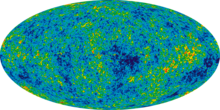
Back عمر الكون Arabic Edá del universu AST Kainatın yaşı Azerbaijani Узрост Сусвету Byelorussian Възраст на Вселената Bulgarian মহাবিশ্বের বয়স Bengali/Bangla Edat de l'Univers Catalan Weltalter German Ηλικία του σύμπαντος Greek Edad del universo Spanish
| Part of a series on |
| Physical cosmology |
|---|
 |
In physical cosmology, the age of the universe is the time elapsed since the Big Bang: 13.8 billion years.[1] Astronomers have two different approaches to determine the age of the universe. One is based on a particle physics model of the early universe called Lambda-CDM, matched to measurements of the distant, and thus old features, like the cosmic microwave background. The other is based on the distance and relative velocity of a series or "ladder" of different kinds of stars, making it depend on local measurements late in the history of the universe.[2] These two methods give slightly different values for the Hubble constant, which is then used in a formula to calculate the age. The range of the estimate is also within the range of the estimate for the oldest observed star in the universe.[3]
- ^ Planck Collaboration (2020). "Planck 2018 results. VI. Cosmological parameters". Astronomy & Astrophysics. 641. page A6 (see PDF page 15, Table 2: "Age/Gyr", last column). arXiv:1807.06209. Bibcode:2020A&A...641A...6P. doi:10.1051/0004-6361/201833910. S2CID 119335614.
- ^ Verde, Licia; Schöneberg, Nils; Gil-Marín, Héctor (13 September 2024). "A Tale of Many H0". Annual Review of Astronomy and Astrophysics. 62: 287–331. doi:10.1146/annurev-astro-052622-033813. ISSN 0066-4146.
- ^ Vagnozzi, Sunny; Pacucci, Fabio; Loeb, Abraham (1 November 2022). "Implications for the Hubble tension from the ages of the oldest astrophysical objects". Journal of High Energy Astrophysics. 36: 27–35. arXiv:2105.10421. Bibcode:2022JHEAp..36...27V. doi:10.1016/j.jheap.2022.07.004. ISSN 2214-4048.